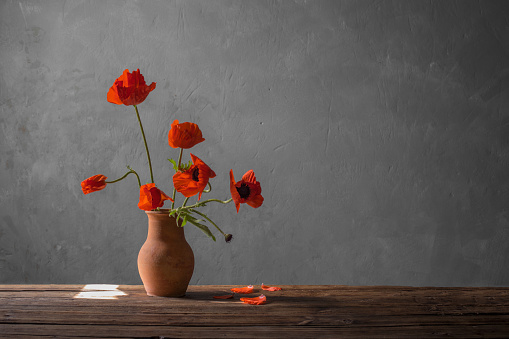
I am not a terrorist.
This morning, I set out to travel to Uyo. I sat up in bed, looked out the dust-covered louvers and saw the cloudy sky. Yet another day of impending gloom. I sighed and listened for a few seconds to the sounds around me.
A little child cried in the distance and I could hear the mother shouting threats and spanking her more. The sound of okadas veering past somewhere, a few miles ahead caught my attention. I was back in my room when I heard a sound of something crawling past my callused black feet. It was the rat I had been unable to kill for the past two weeks, so I had given it freedom to share the cramped room with me.
I rubbed my hard back and stretched my slender black body, the body of a laborer. The loads I had hauled back and forth destinations on my back were telling their tale now. The small spring bed creaked in protest of my weight as I shifted positions.
Life was hard but I had become tougher to meet its demands. My parents had near abandoned me since I was barely thirteen. I had spent ten years finding my feet and fending for myself in a strange land. And yet, my feet remained hidden, because I hadn’t yet found them.
I remember how I came to the city of Aba. My father had called me up late one night to the small space outside our house that we used to host visitors. He told me that I was a grown man now, and according to our culture, it was time to fend for myself.
I had just clocked thirteen three months earlier but I didn’t cry at the news. Father had always told me from childhood, that men do not cry. Of course I was scared, but I refused to show it.
If Father had sensed fear in me at all, he didn’t react to it. He rather told me that a big lorry was coming to the market tomorrow to transport goods to the East and that he had spoken to one of his friends that had decided to join the lorry to the East to start a new life, and that this friend had agreed to take me with him.
“Yes, father”, I had said and fifteen hours later, I was in the city of Aba. I watched in amazement from where I was standing in the lorry amidst cows and yams and big jute bags, at the city bustling with life. I drank in the intoxicating scent of business, diligence and hard work.
It was nothing like where I was coming from. Everyone seemed to be busy going somewhere or returning from somewhere or doing something. Vehicles of all kinds rammed into streets and roads with frightening speed. Very little people paid any attention to our lorry or the goods and people it carried, except little toddlers clutching the hands of their hurtling mothers and struggling to keep in pace with their speed.
The friend of my father’s who had taken me in was nice. At least he provided a roof over my head and fed me as much as he could, but he asked me to find something to do if I was to continue staying with him. So every morning, after he left, I would go out into the streets to beg. People hardly paid me any attention. They avoided me like a disease and threw me looks of disgust and I didn’t know why at first. It wasn’t until recently that I understood why: my identity.
I sighed again and found my plastic kettle and drank water from it. I thought about how I had moved from begging to doing all sorts of menial jobs from shoe mending to carrying cement blocks, to hauling loads for marketers. I retrieved my small Koran from underneath my hard pillow. I glanced at a few lines distractedly, glossing over the words before I closed it again in defeat. Maybe I’d read it next time.
I got up and stretched again. I went to the small wooden table that was the only furniture I was able to afford from all the menial jobs i did daily. I picked up my small mirror. I ran my hand over my bushy hair and then over the three tribal marks that embellished my rough face. Then I stroked my full dusty brown beards that were in need of a shave. I made a mental note to buy some shaving sticks in the day.
An hour and thirty minutes later, I was on my way to the park where I’d board a car going to Uyo. One of the big men I had worked for had asked me to come to his construction site to help him work there. He had been surprised at my honesty and integrity when I last worked for him, as he said, so he promised to keep in touch. I was really excited. I hadn’t traveled before in a real vehicle so I prepared well for this one. I had taken a good bath and combed my hair with extra effort and ensured my unruly beards looked decent enough.
My house was close to the park, so I trekked. There was a big market just before the park and so I entered it. It was already bustling with activity.
I dodged more than once from the hefty bare-chested men who spat out angrily “uzo!” to ward people off their path as they pushed their trucks overflowing with heavy goods of market people. I glanced briefly at a young woman who was displaying her goods – various colorful fabrics, just before she caught my eye and said “Aboki, you no go waka where you dey go?” , then she muttered some curses under her breath in Igbo, ignorant of my understanding of them.
I was just about leaving the market when I heard the noise of a commotion behind me. I turned to see a handful of people running towards my direction with clubs and sticks. For a moment I didn’t give it much attention, just another market wahala, not until I saw a woman pointing to my direction and saying “Lewkenu ya o. Onye ohi”. I was confused and started running because I was sure I had done nothing. But in minutes, the angry mob outran me and clamped me down and began beating me.
“Ndi obi ojo. Ndi Awusa ndi ekwensu!” Someone shouted.
“Onye ohi! Ndi Boko Haram! Unu egbushi chala umu nwanne anyi no na North” another added.
“Kponu Buhari ka obia nyere gi aka ugbua. Ndi ojo! Ntoo!”.
“Ndi Boko Haram! Anyi ga ahapurunu Nigeria gawa Biafra”
I was still struggling to explain to them that I was innocent, when one of them suggested in Igbo that they bring a tyre to burn me. I froze with fear. I was still hopelessly confused.
Thankfully, though, someone else shouted that they had caught the thief and I was innocent. They all left. Not one person spoke words of pity or remorse for me. No one acknowledged that I had been wronged. Instead, I heard one tell the other that it’s my luck that I wasn’t the one, because he would have been the one to set me on fire. Then he spat close to the ground I was sprawled on.
I picked myself up and shamefacedly returned home. I had had other forms of discriminatory episodes, but this climaxed them all. Everywhere I went, people looked at me with disgust and treated me condescendingly the way they did every other person from the North. They avoided body contact and if it ever happened inadvertently, they cursed and acted like they had contracted Ebola.
I cleaned myself and changed my clothes. Then I went out to the park. This time I didn’t trek. I boarded a bike and even the bike man looked at me with contempt in his eyes. He refused to engage in a conversation with me even when I tried to.
I reached the park and located the area for Uyo. The man at the counter looked degradingly at me as though I wasn’t capable of paying the fare and looked surprised when I brought out my brown weathered wallet to give him the thousand naira note for the trip. He grunted and asked me to write my name in the manifest. Then shoved a ticket to me without saying a word.
I found the bus whose number was written on the ticket and went to it. There were five passengers already seated. And the moment the girl sitting just behind the driver’s seat saw me, she frowned and looked away. When I asked if someone had taken the seat close to hers, she hastily replied yes, even though I was sure that the seat was vacant.
I turned to the seat behind, where a fat woman and her teenage daughter sat and asked if someone had taken the seat beside them and the mother quickly said yes just as the daughter was about to say no. I sighed and resigned myself to the empty seat behind them.
Two minutes later, two other passengers came. The first, a lady, asked the same girl I had asked earlier about the seat and the girl told her it was vacant. The other one, an older woman in her mid fifties was about to take the seat beside me when she looked at me and changed her mind. She rather took the seat in front.
Three other passengers rejected sitting close to me until the driver threatened to return their tickets. One of them, a young man of about thirty, finally agreed and he sat beside me, keeping as much distance as the space would allow him.
As the bus revved off, I pondered on my life in the East. I was treated as a pariah simply because I was from a Northern tribe and the Ibos had an ugly history with my tribe. No one considers how I feel in all this. I feel sympathetic towards the killings the members of their tribe and others had suffered at the hands of my brothers in the North, but no one ever considers that. People like me have no right to live like every normal person in their land; we are outcasts. Because I am Fulani and a Muslim, I am looked upon as a terrorist, a counterpart of the Boko Haram sect.
But my name is Musa Abubakar. And I am not a terrorist.
